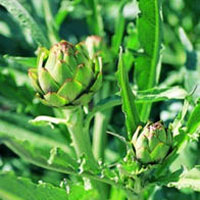Gluten Free
What does following a gluten-free diet mean? That you're embarking on an easy diet with a wide range of health-promoting effects. Instead of dwelling on what you’re giving up, consider that you’re going to enjoy a whole new world of delicious food options to meet your special dietary needs. You’ll be eating seasonally, choosing more fresh fruits and vegetables, focusing on meats, seafood, poultry, legumes, lentils, corn, and rice, and discovering fascinating ancient grains such as quinoa, amaranth, and millet. You’ll be able to eat potatoes, eggs, most cheeses, even chocolate (!)—and enjoy them without guilt because you’ll be taking good care of your body. In fact, you’ll probably end up eating—and feeling—better than ever!
Visit this page for more information about living Gluten Free
---
We carry a large variety of gluten free items, the brands listed below represent just some of the offerings we carry















More Diets
Artichoke
 © Martin Wall
© Martin WallHow It Works
Artichoke leaves contain a wide number of active constituents, including cynarin, 1,3 dicaffeoylquinic acid, 3-caffeoylquinic acid, and scolymoside.3 The choleretic (bile stimulating) action of the plant has been well documented in a controlled trial involving a small sample of healthy volunteers.4 After the administration of 1.92 grams of standardized artichoke extract directly into the duodenum, liver bile flow increased significantly. This choleretic effect has led to the popular use of artichoke extract in Europe for the treatment of mild indigestion—particularly following a meal high in fat. In an uncontrolled clinical trial with 553 people suffering from non-specific digestive disorders (including indigestion), 320–640 mg of a standardized artichoke extract taken three times per day was found to reduce nausea, abdominal pain, constipation, and flatulence in over 70% of the study participants.5
The standardized extract has also been used to treat high cholesterol and triglycerides. In one preliminary trial6 and one controlled trial,7 use of a standardized artichoke extract was found to lower cholesterol and triglycerides significantly when taken in amounts ranging from 900 to 1,920 mg per day. One preliminary trial failed to find any effect.8
While scientists are not certain how artichoke leaves lower cholesterol, test tube studies have suggested that the action may be due to an inhibition of cholesterol synthesis and/or the increased elimination of cholesterol because of the plant’s choleretic action.9 In test tube studies, the flavonoids from the artichoke (e.g., luteolin) have been shown to prevent LDL-cholesterol oxidation—an effect that may reduce risk of atherosclerosis.10
How to Use It
The suggested adult amount of the standardized leaf extract is 300–640 mg three times daily for a minimum of six weeks.11 Alternatively, if a standardized extract is not available, the amount of the crude, dried leaves is 1–4 grams, three times a day.12
Copyright © 2025 TraceGains, Inc. All rights reserved.
Learn more about TraceGains, the company.
The information presented by TraceGains is for informational purposes only. It is based on scientific studies (human, animal, or in vitro), clinical experience, or traditional usage as cited in each article. The results reported may not necessarily occur in all individuals. Self-treatment is not recommended for life-threatening conditions that require medical treatment under a doctor's care. For many of the conditions discussed, treatment with prescription or over the counter medication is also available. Consult your doctor, practitioner, and/or pharmacist for any health problem and before using any supplements or before making any changes in prescribed medications. Information expires December 2025.











